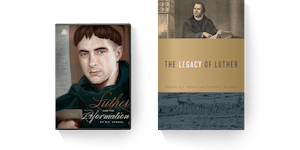
This sponsored post was provided by Ligonier Ministries.

One of the deepest ongoing concerns Martin Luther had as a pastor was to liberate his congregation from the chains of superstition. As people began to leave the Roman Catholic system, they did not expunge from their lives all of their former convictions. This was particularly evident with respect to relics.
The town of Wittenberg boasted one of the largest reliquaries in Germany, amassed by Luther’s protector, Frederick the Wise, elector of Saxony. Frederick had spent a fortune to gather precious relics from around the world in the hopes that it would make Wittenberg a mecca for Christian pilgrims, thus enhancing the town as a spiritual and commercial center in Germany. From 1509 to 1518, Frederick’s collection of relics had grown to 17,443 pieces with an indulgence value of 127,799 years and 116 days’ release from purgatory.
Luther risked the wrath of Frederick by challenging the validity of the use of relics. In the last sermon Luther preached before he died, he stressed the impotence of relics in contrast to the potency of the gospel:
After all, there is preaching every day, often many times every day, so that we grow weary of it… . Alright, go ahead, dear brother, if you don’t want God to speak to you every day at home and in your parish church, then be wise and look for something else: in Trier is our Lord God’s coat, in Aachen are Joseph’s pants and our blessed Lady’s chemise; go there and squander your money, buy indulgences and the pope’s secondhand junk.
Luther wanted his flock to be fed by the gospel, not the pope’s secondhand junk.
Luther wanted his flock to be fed by the gospel, not the pope’s secondhand junk.
As a pastor, Luther was concerned to minister to the souls of his people. He ministered to their grief in this world. He understood the pain of the loss of loved ones as his own soul was wounded by the death of his young daughter. He bore the physical pains of a host of maladies in his own body and thus exuded empathy for the physical suffering of others.
But Luther’s chief pastoral concern was that his people would know Christ and His gospel. To this end, Luther carried on a profoundly deep practice of intercessory prayer. He said:
Open your eyes and look into your life and the life of all Christians, particularly the spiritual estate, and you will find that faith, hope, love… are languishing… . Then you will see that there is need to pray throughout the world, every hour, without ceasing, with tears of blood.
Luther’s pastoral heart is seen not only in his prayers but most notably in his preaching. He was a doctor of the church, a professor, and an academic. In his role as a professor, his primary task was to teach. There is a clear difference between teaching and preaching. The teacher instructs; he imparts information to his students. But a theologian/preacher can never sever the two roles of teacher and preacher. The great teacher/preachers of history never taught as mere isolated spectators of the past. They combined exhortation with instruction—inspiration with education. In a word, at times their teaching turned to preaching. In like manner, the scholar/pastor mixes teaching with his preaching.
Luther mirrored this method in his preaching. He was concerned to inform his congregation as well as to exhort it. He insisted that his messages should be clear and simple enough that the unlearned could understand them. He said:
Infinite and unutterable is the majesty of the Word of God… . These words of God are not words of Plato or Aristotle, but God himself is speaking. And those preachers are the most suitable who very simply and plainly, without any airs or subtlety, teach the common people and youth, just as Christ taught the people with homespun parables.
The gospel, the gospel … all for the gospel. This is the love, the task, the vocation of all who wear the robes of the theologian and all who wear the gowns of the preacher. Luther was equally comfortable attired in either.
 This excerpt is from The Legacy of Luther edited by R.C. Sproul and Stephen Nichols. For a limited time, get this new hardcover book along with R.C. Sproul’s 10-message teaching series Luther and the Reformation on DVD for a gift of any amount. Make a donation today and request this Martin Luther Resource Package. (US & Canada Only. Offer ends 11/7/2016.) You can also learn more about Martin Luther at LegacyOfLuther.com.
This excerpt is from The Legacy of Luther edited by R.C. Sproul and Stephen Nichols. For a limited time, get this new hardcover book along with R.C. Sproul’s 10-message teaching series Luther and the Reformation on DVD for a gift of any amount. Make a donation today and request this Martin Luther Resource Package. (US & Canada Only. Offer ends 11/7/2016.) You can also learn more about Martin Luther at LegacyOfLuther.com.










